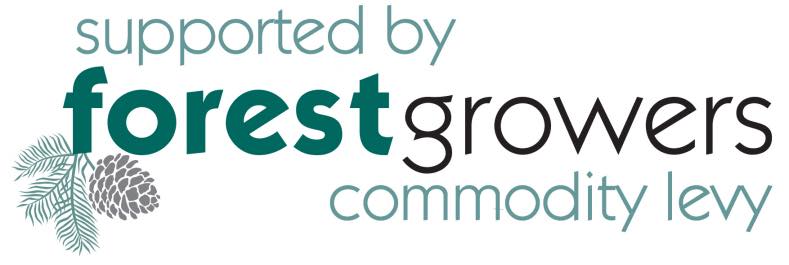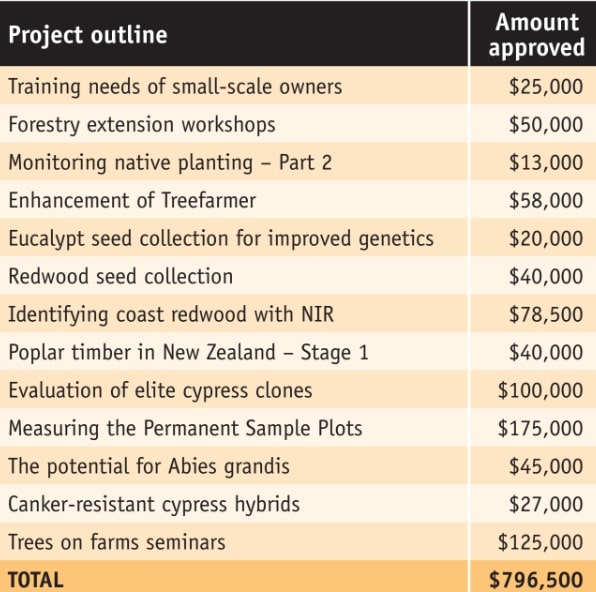
This is free.
Grants which will benefit small-scale forest owners
Julian Bateson, New Zealand Tree Grower May 2023.
We all know about the Forest Growers Levy, or we should do. For every log sold a levy of 33 cents a tonne is taken and the money used for a variety of activities. This process is managed by the Forest Growers Levy Board, a secretariat and a number of committees who report to the levy board.
Each year the Forest Growers’ Levy Trust collects around $9 million from the levy raised on the sale of every tree harvested.The amount varies, but after the costs of administration and running the levy process, approximately $8 million is available to spend on all the good things for which the levy is raised.These include research, biosecurity, training, promotion, health and safety as well as for projects directly relevant to owners of small forests.
Each year the committees managing these subjects invite applications for grants to undertake appropriate and useful projects. Such projects can vary from multi- million, multi-year programmes to those valued at a few thousand dollars completed finished in a few months. In the past few years small-scale forest owners, represented by the NZFFA, have applied for these grants and have had significant success.
For example, applications in 2021 for work to be carried out in 2022, the NZFFA applied for projects which added up to a little over $750,000. Of these, seven were approved for funding, representing a total of just over $400,000 of levy money. For work in this year 2023, applications were made for small-scale forestry projects worth just over $740,000.There were two more projects not directly applied for, but supported by the NZFFA, adding a further $140,000 of requests.
To add to it all, there was an additional fund of money which became available from the Industry Transformation Plan launched in December 2022.
It brought in another source of money and a certain amount of confusion. However, it resulted in some of the projects being fully funded by the levy, some by the Industry Transformation Plan and some jointly.
What was the final result?
The result has meant that 12 projects were fully or jointly funded by the Forest Growers Levy and the Industry Transformation plan. In addition,Te Uru Rakau – NZ Forest Service agreed to continue with the forest extension project which they supported in 2022, and which is backed by funding from the levy.This has meant just under $800,000 has been made available in 2023 for projects which directly benefit small-scale forestry.The summary is in the table below.

The project applications themselves each occupy a number of pages. However, short precis of each of the applications are given on the next few pages.
Eucalypt seed collection for improved genetics $20,000 granted
Following an initial seed collection in 2022, the Eucalypt Action Group aims to continue with this work and gather more seed from well-known stringybark eucalypt stands around the country.The seeds will be used to extend a project that Scion has been working on for several years, to improve eucalypt germplasm.
Until now, work has not been carried out to secure and improve germplasm from the stringybarks, which have been the backbone of eucalypt planting for timber production in New Zealand. Stringybark eucalypts are regarded as the best substitute for imported tropical hardwood for the building industry.
To investigate training needs of small-scale forest owners $25,000 granted
A small survey of small-scale forest owners in 2016, the Insights and Opportunities Report on Education and Training Opportunities for Silviculture and Harvesting identified that the learning and training needs of this group were not being met. Small-scale forest owners are unwilling to enrol for lengthy courses and are generally looking for skills and knowledge rather than qualifications.
This application is for funding to assess their learning and training needs, taking into account a wider sample group representative, confirm the modes of presentation which best suit their needs and determine their willingness to participate in training. A refined inventory of existing training resources will be produced suited to small-scale forest owners along with a review of the training available.
Monitoring native planting to improve future success $13,000 granted
This will be a continuation of the previous work to monitor native planting, and from these results, provide recommendations and advice on sites and species
to improve future success.There will be appropriate monitoring and assessment of current native planting across the country on a variety of sites, and by a variety of planting groups. Particular attention will involve those which have had funding by the tax payer or rate payer such as the Ministry for Primary Industries and Te Uru Rakau along with regional or district councils.The aim is to improve the economic value of native planting by helping to improve the frequently low survival rate of native planting and the overall productivity of native tree planting.
The potential for Abies grandis as a contingency species $45,000 granted
A levy board grant last year has meant confirmation that New Zealand grown Abies grandis is a valuable softwood with timber properties capable of substituting for radiata pine.
The aim is now to develop nursery systems to grow this species at scale and if possible, to produce strong planting stock within a growing season.There are enough seeds to grow several thousand seedlings which will form the basis of this research.
Existing owners of small and medium forests may consider diversifying into A. grandis as a valuable species, and land owners opposed to radiata may consider planting it.These new forests should help insure the New Zealand wood processing industry against the possible widespread failure of radiata pine, provide greater resilience to the forestry sector and wider market opportunities for export logs and timber.
Identifying coast redwood trees for heartwood durability $78,500 granted
Near infrared spectrometry has proved to be a successful technique to determine heartwood durability in coast redwood. Applying this technology to trees of superior growth and form within mature stands will help in identifying trees capable of contributing to breeding programmes.This project will provide the basis for producing seedlings and clones of coast redwood that have proven heartwood durability.
Evaluation of elite cypress clones for high quality timber $100,000 granted
Cypress clones developed by Scion and already selected for their growth, form, vigour and canker resistance will be investigated for their timber properties, and whether these properties vary across trial sites with different climates.The timber will be tested for heartwood content, heartwood colour, timber stiffness, strength and durability.
This is the necessary final evaluation before commercial deployment of Scion’s elite cypress clones to the forest industry. Cypress is recognised as a high value species and growers are expected to plant it at scale if they are assured of the productivity and timber properties.
Assess and select canker-resistant cypress hybrids $27,000 granted
This project is to assess a range of canker-resistant cypress hybrids from Scion trials planted in 2017.The 100 most promising candidates in terms of growth and form will be selected, cuttings taken and stoolbeds established at two locations for their mass propagation. These will give the opportunity for reproduction at forestry scale once the selections are later refined by timber testing.
Measuring the permanent sample plots of alternate species $175,000 granted
There are nearly 700 permanent sample plots for alternative and contingency species around the country, of which nearly 500 have not been measured in the last 10 years.With levy funding in 2022 the NZFFA began a re-measurement programme so that in the future, the relevant growth models and yield tables can be brought up to date. Redwood tables have already been improved as a result, which has led to a boom in forward orders for redwood seedlings.This project is to re-measure the balance of around 300 permanent sample plots across the country, to establish a number of additional plots in suitable locations and to commission Scion to record and maintain the data.
Proving the commercial viability industry for poplar timber $40,000 granted
This is to undertake research which will identify, analyse and report on the status of poplars.This will be in terms of tree growth characteristics in different environments including assessing yield from sample plots as well as timber production, milling and marketing. Similarly, research and report on overseas practices for growing, managing and harvesting poplar from natural forests and plantations. Finally, the aim is to form a Poplar Timber Action Group similar to other NZFFA special interest groups.
Enhancement of Treefarmer $58,000 granted
This project is specifically targeted at small-scale forest growers. It is readily available and relevant to those who are about to plant or are thinking of harvesting.
Treefarmer has been developed in stages and provides integrated desk top results from various projects including yield and risk models as well as carbon tables which are regularly improved with new data and modelling techniques.The costs and prices need adjustment on a regular basis.
Redwood seed collection $40,000 granted
The project is to collect seeds from New Zealand grown redwood of known genetic diversity to meet the recent significant demand for redwood tree stock. Most redwoods in recent years have been grown from seeds imported from California.This has a number of disadvantages and means they are not always suitable to New Zealand conditions.
To encourage land owners to plant trees $50,000 granted
Following the success of a series of pilot workshops which the NZFFA ran for sheep and beef farmers earlier this year,Te Uru Rakau – NZ Forest Service would like the NZFFA to carry out specific projects that will help it meet its objectives in forestry promotion, education and extension.This application is for co-funding to assist with the first annual programme through 2023.
As rural sentiment favours trees on farms, rather than trees or farms, the farm forestry model of land use is seen as an important part of the national afforestation strategy. We need to promote forestry and help educate land owners on the why, what, how and where of afforestation. The aim of the work programme will be to help land owners to become successful small-scale forest growers.
Promote the benefits of trees to land owners $125,000 granted
This is a project funded by Te Uru Rakau – New Zealand Forest Service and partly co-funded from the levy project mentioned earlier.The aim is for the NZFFA to develop and present a series of seminars or workshops across New Zealand to promote the benefits of trees to land owners, especially those who have not grown trees on their land before.The workshops will present basic information on the benefits of trees, outline species options and forestry regimes and where to find funding and support.
Grant summary
As usual, all the projects funded by the Forest Growers Levy, the Industry Transformation Plan and Te Uru Rakau – NZ Forest Service depend on additional and significant in-kind contribution.This is work carried out by NZFFA members and others, but not paid for. This can be the equivalent of half as much again as the financial grant.
Preparing grant applications can also take a lot of time. As in previous years, this has been carried out by volunteers, mainly from the NZFFA action groups.
The contribution by those giving time to preparing grant applications cannot be over-estimated.Without such unpaid work, the grants worth nearly $800,000 for small-scale forest owners would not be available.We owe them all our thanks.

 Farm Forestry New Zealand
Farm Forestry New Zealand